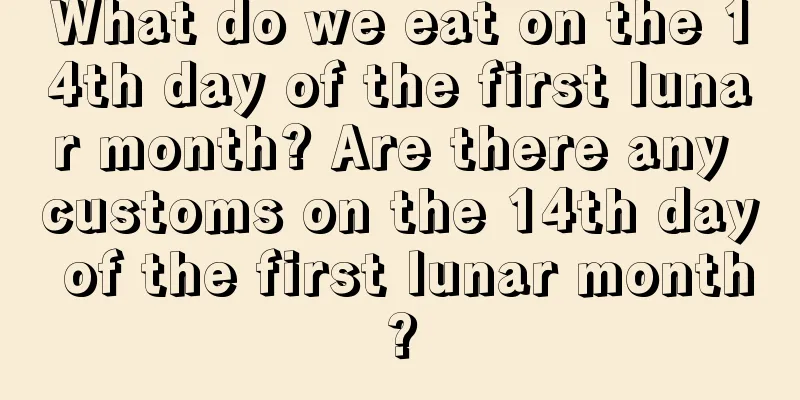What do people eat in the south on Chinese New Year’s Eve? What's the special thing about Chinese New Year's Eve?

When the Little New Year comes, people start preparing New Year's goods, sweeping the house, and offering sacrifices to the Kitchen God in preparation for the Spring Festival. Want to know more about Xiaonian? As the saying goes, "The seventh and eighth days of the twelfth lunar month are so cold that crows freeze to death." The twelfth lunar month represents the arrival of cold winter. If you want to know more about the twelfth lunar month of 2021, please visit Mr. Shui Mo's website.What do people eat in the south on Chinese New Year’s Eve?People in the south usually eat glutinous rice balls and sugar-coated melons on New Year's Eve.1. Rice Balls In the South, there is a custom of eating glutinous rice balls during the Chinese New Year, which symbolizes reunion. During the Little New Year in the South, people use glutinous rice balls to "send off the Kitchen God". Because glutinous rice balls are made of glutinous rice and are sticky to the teeth, the meaning is similar to eating sugar-coated melons. 2. Sugar Melon On the day of Little New Year, there is a folk proverb that goes "On the 23rd, sugar melons are sticky, and the Kitchen God is going to heaven", which means that people will use sugar melons to worship the Kitchen God on this day. Tanggua is a very sticky malt sugar that comes in various styles. Because it is used to worship the Kitchen God, it is also called "Kitchen Sugar". It is a traditional snack during the Chinese New Year. What's the special thing about Chinese New Year's Eve?The main folk activities on the eve of the Chinese New Year are worshiping the kitchen god and sweeping the house, and there are many details to pay attention to when doing these two activities.1. Offering sacrifices to the Kitchen God Offering sacrifices to the Kitchen God is an important activity on the day of the Little New Year. In addition to offering sugar melons and cakes, people also have to replace the portrait of the Kitchen God. While taking down the old image of the Kitchen God, every household also has to "invite" back a new one. There is a folk custom that "men do not worship the moon, and women do not worship the Kitchen God", so worshiping the Kitchen God is limited to men. In addition, it is said that on the night of New Year’s Eve, the Kitchen God will come to the human world with other gods to celebrate the New Year, and there will be ceremonies of "welcoming the Kitchen God" and "welcoming the gods" on that day. After every household burns sedan chairs and horses, pours three cups of wine and sends off the Kitchen God, it is then their turn to worship their ancestors. The Kitchen God worship ceremony is usually held at night. When offering sacrifices to the Kitchen God, the worshiper kneels in front of the Kitchen God statue and holds a rooster in his arms. Some people also let children hold a chicken and kneel behind adults. It is said that the chicken is the horse that the Kitchen God rides on when he ascends to heaven, so the chicken is not called a chicken but a horse. If it is a red rooster, it is commonly known as "red horse", and if it is a white rooster, it is commonly known as "white horse". After burning incense, the house is filled with smoke, full of mystery. The male host poured the wine, kowtowed, and muttered something. After finishing reading, the person offering sacrifices to the Kitchen God shouts “Ling”! Then pour the wine on the chicken's head. If the chicken's head flutters with a sound, it means the Kitchen God has appreciated your kindness. If the chicken head does not move at all, you need to water it again. After the Kitchen God worship ceremony, people begin to eat Kitchen God foods such as kitchen sugar and fire cakes. In some places, they also eat sugar cakes, fried cakes, and drink tofu soup. 2. The day of house sweeping starts from the 24th day of the twentieth month and lasts until New Year's Eve. In China, people call this period of time "the day to welcome the spring" or "the day to sweep the house". "Sweeping the dust" means the year-end cleaning. Every household has to clean the environment, clear various utensils, take apart and wash bedding and curtains, sweep the courtyard, dust off dust and cobwebs, and dredge open and underground ditches on this day. Everywhere is filled with the atmosphere of happily cleaning up and welcoming the New Year in a clean manner. The purpose of sweeping the house is to get rid of the old and welcome the new, and to remove bad luck. Sweeping the dust is the year-end cleaning, which is called "sweeping the house" in the south and "sweeping the room" in the north. Sweeping the house before New Year's Day is a traditional custom of the Chinese people. Every time the Spring Festival comes, every household has to clean the environment. They tie green bamboo leaves and pomelo leaves to poles and sweep the dust and cobwebs on the roof ceiling and walls. This is said to sweep away "bad luck" and "bad luck" and bring good luck in the coming year. In addition to sweeping the house, they also have to clean various utensils, take apart and wash bedding and curtains, sweep the courtyard, dredge open and underground ditches, etc. All over the country, people are welcoming the New Year with a clean atmosphere. Folk experts said that sweeping the dust not only means to drive away diseases and pray for good health in the new year, but also means to get rid of the "old" (dust) and usher in the new. According to Chinese folk saying: because "dust" and "old" are homophones, sweeping the dust during the New Year has the meaning of "getting rid of the old and welcoming the new", and its purpose is to sweep away all the "bad luck" and "bad luck". This custom embodies people's desire to break the old and establish the new and their prayers to bid farewell to the old and welcome the new. Do you want to know your own Bazi? Want to figure out where your golden marriage is? Click on the [Premium Calculation] below to calculate your horoscope and fortune! |
Recommend
Is it possible to move house during the Big Snow season in 2018? Tips for moving
Everyone should have a home, especially the Chines...
Is it a good day to move to a new house on Mother's Day 2020? How many days are left until Mother's Day 2020?
Introduction: Moving to a new house also requires ...
In which direction is the auspicious position of the God of Wealth when the Dragon raises its head in 2017?
Introduction: The God of Wealth has a great influe...
Is February 22 of the lunar calendar 2022 a day of underworld? Can’t start renovation?
The lunar calendar divides days into unlucky days ...
The position of the God of Happiness on June 20, 2020, and the position of the God of Happiness at different times
The sixth month in the lunar calendar is the firs...
Can we install the door on April 12th of the lunar calendar in 2022? Is it an auspicious day?
The fourth month of the lunar calendar has arrived...
Is Women's Day Mother's Day? What should I give my mother on Women's Day?
Women's Day is on March 8th of the Gregorian c...
Can I move house during the Lantern Festival? What should I pay attention to when moving?
The Lantern Festival is a day for family reunion, ...
Is the White Dew season going well in 2021? What are the taboos on the day of Bailu?
The quality of life is different every day, so let...
What is the saying about burning green seedlings at the beginning of autumn? Do people born in the beginning of autumn and whose zodiac sign is horse have good fortune?
What is the saying about burning green seedlings a...
Where is the God of Happiness on the twelfth day of the eleventh lunar month in 2020?
Where is the God of Happiness on the twelfth day ...
Is it necessary to drink Guyu tea during the Guyu solar term? How should we offer sacrifices to the sea during the Guyu solar term?
Introduction: Guyu is one of the 24 solar terms, a...
Is May 24th of the lunar calendar in 2021 an auspicious day? Can the funeral be held there?
The fifth month of the lunar calendar, which is th...
What are the auspicious days for setting up the bed in February of the lunar calendar 2018?
The word "An Chuang" often appears in th...
Is the seventh day of the seventh lunar month in 2021 an auspicious day? How does the lunar calendar predict good or bad luck?
Nowadays, many people choose auspicious days to do...









